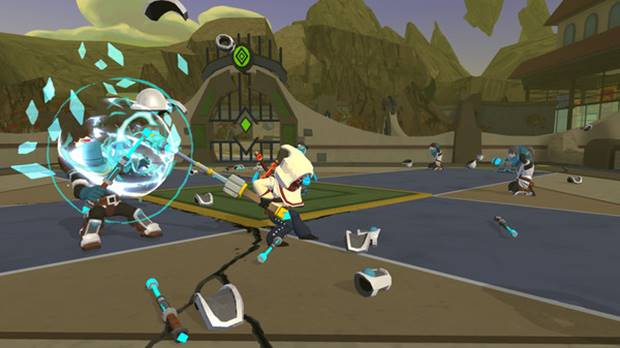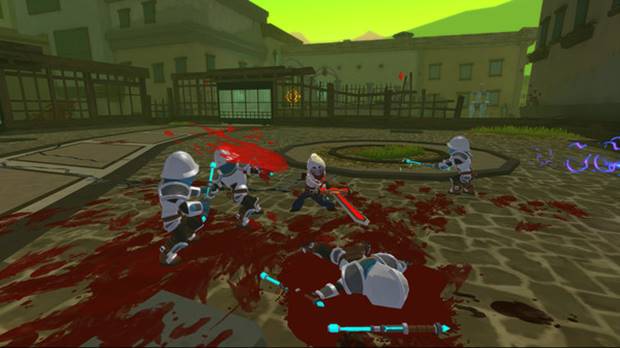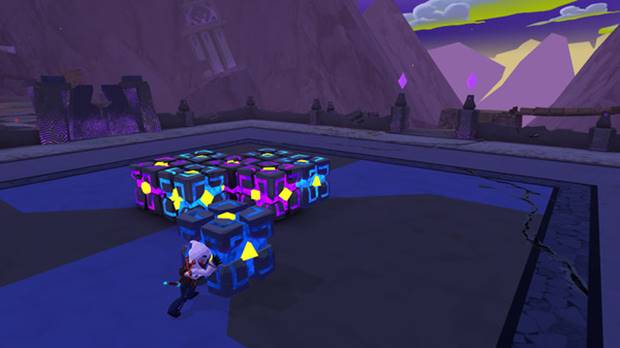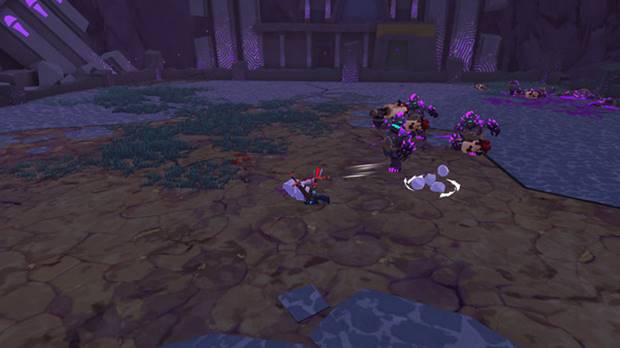
Too often, games make the promise of presenting players with meaningful choices that will lead to proper divergent paths in the story, and too often, they fail to make good on that promise. Upcoming action adventure title Hindsight 20/20 by indie studio Triple-I Games, however, is looking like an interesting prospect, because it’s banking hard on its choice and consequences mechanics, to the extent where the development team ended up making an entire engine just to support that aspect of the experience.
We’ve been curious about this title for a while now, and hoping to learn more about it, we sent across some of our questions to the developers. Creative director Hemanshu Chhabra responded to the questions below, with highly detaile and very interesting answers about the game’s choice and consequence mechanics, its inspiraitions, its development, and a lot more.
"One of the major motivations in creating Hindsight 20/20 is to provide players a unique experience of crafting a story and destiny that feels personal to them."
How divergent and branching can we expect Hindsight 20/20’s choice and consequence mechanics to be?
For me, one of the major motivations in creating Hindsight 20/20 is to provide players a unique experience of crafting a story and destiny that feels personal to them. To accomplish this goal, I wrote a gameplay middleware engine called the “Experience Engine.” This allows us to create choice and consequence mechanics that can lead to many unique and divergent experiences for players throughout their journeys. During each playthrough of the game, which lasts for about 6 hours, the player is presented with several choices and moral dilemmas. There are no easy answers for these challenges and there are no “right” or “wrong” solutions for these problems.
For example, you play as a character who belongs to the peaceful town of Champaner, one that values life at its core. The sheriff of this town has secretly murdered your father for unknown reasons. Will you avenge the death of your father but risk being perceived as a killer by the people of Champaner, or will you spare his life, and allow him to grow more powerful?
Your best friend, Andrew, has been infected with a virus that could turn him into a blood-thirsty beast at any moment. Andrew wishes to end his misery by taking his own life. Will you respect his wishes and let him commit suicide, or will you convince him to live, but risk him harming others in the future?
The town you belong to is under threat from a rival town that is dominated by blood-thirsty beasts. Will you do whatever it takes to save your town, even if it means annihilating the rival town, or will you try to find a middle ground? Or will you, depending on the experiences you have, go against the value systems of your own town? Moral dilemmas like these are the backbone of Hindsight 20/20, and every choice and action you perform can have meaningful consequences and lasting repercussions. The future of your town is at stake, and even one single choice has the potential to change everything.
How important is the Experience Engine in terms of the game’s choice-based gameplay? For our readers, can you tell us what its exact role is in all this?
Hindsight 20/20‘s gameplay loop ensures that your choices and more importantly, the consequences of those choices matter to a great degree. The choices and actions made by players can lead to butterfly effects in the story that they may not have anticipated. This provides a lot of motivation to play the game again and make different choices.
The reason I built the Experience Engine is that without it, we could not possibly create a game with this many branching paths for both story and gameplay. If we had used a traditional approach of just storing the player choice data in quest variables, we would be extremely limited in what the effects of your choices could branch to. This is precisely why one of the most common complaints players about most choice-based games is that their choices rarely matter, and if they matter, their scope is extremely limited.
The sheer scale of choices and consequences in Hindsight 20/20 required me to build a gameplay middleware engine that did two things:
- Allow management of tons of choices and the permutations of those choices, their branching paths and the consequences they can have to several entities.
- Record every choice and action made by the player and use that data to find which branching path to present and which consequences to execute on the relevant entities.
All of your choices and consequences are carefully observed and recorded by the Experience Engine while you are playing the game. Thanks to this, every entity in Hindsight 20/20 is aware of your choices and actions and reacts to you accordingly. Some examples of these include:
- NPCs: NPCs are aware of what you have been doing that is relevant to them, and in the larger context of the story as well. They react to your choices and actions in various ways. They can be afraid of you. They might attack you. They might beg you for mercy. They might offer you a truce. Or, they might just treat you unfairly. The choices that NPCs make are dependent on their character, the context of the story and most importantly, the choices and actions performed by you until then.
- Story: The story is a living and breathing entity in Hindsight 20/20. It dynamically adapts itself to the choices and actions performed by the player. The ability to craft your own story and destiny is what sets us apart from most adventure games.
- Bosses: Bosses in Hindsight 20/20 have multiple traits to their personality. When you meet a boss, he or she may present only certain aspects of their character set to you. The way they interact with you, both in story and gameplay would be contingent on their own morality and values, the choices made by you, and the context of the story at that time. If players make different choices in the next playthrough, they will discover surprising things about those characters. Even in combat, a boss may choose to fight you very differently and apply entirely different strategies than what you had witnessed before. Just like in real life, you are constantly surprised the more you learn and discover about people, even ones you are close to. Hindsight 20/20 explores this feeling for many of its major characters.
- Town: The entire town of Champaner is malleable in its form and function. It switches between its states depending on the choices and actions performed by the player and the context of the story at that time. Each state change can cause all of the townsfolk to react very differently to the player as well.
All the major game-systems in Hindsight 20/20 are able to respond to choices and actions made by the player. This is how the Experience Engine allows us to deliver an experience where player choice is at the center of everything.
"Three of the four members of the core team, myself included, have worked at BioWare on Star Wars – The Old Republic which is arguably one of the best story-based MMOs you will find. It was important for us to harness that experience for two reasons: to help us in our development, and to create something we had not done, or more accurately, could not possibly do in the AAA space."
With your development team being comprised of people coming from some of the top RPG studios in this industry, how is that experience helping with the development of this title?
Three of the four members of the core team, myself included, have worked at BioWare on Star Wars – The Old Republic which is arguably one of the best story-based MMOs you will find. It was important for us to harness that experience for two reasons: to help us in our development, and to create something we had not done, or more accurately, could not possibly do in the AAA space. It is one of the biggest reasons we founded Triple-I Games, to make games like these that are too risky or not scalable in the AAA space.
The biggest AAA experiences we are leveraging are those of building scalable game systems. For all the big games we have worked on, you have to always keep scale in mind when building any game system. All the systems in Hindsight 20/20 have been carefully crafted to account for the various ways in which they would need to scale.
The other experience we have is of being conscious of performance from the beginning. It is our goal to have Hindsight 20/20 running at 60fps on all consoles. Doing so for a 3D game of our scale is difficult, but we are pushing ourselves to get that frame rate because we understand how important that is for an action game like ours.
One of the things we are doing that we haven’t in our past AAA experiences is treating player choice very differently. Player choice is the one pillar that trumps everything else in our game. It is the sole reason that I wrote an engine that allows choices and their consequences to be scalable in regards to their data representation and execution.
Hindsight 20/20 offers players the choice to either play lethally with swords, or non-lethally with stun batons- but is that indicative of binary choices being made throughout the game?
No, it is not. While it may seem that using a sword is a “bad” action and using a stun-baton is “good”, when and where you use a particular weapon or make a specific choice can lead to unexpected outcomes. Hindsight 20/20 is always trying to allow the player to discover the power of his or her morality. For example, would forgiving your father’s killer for his deeds be a good action? Or, should you teach him a lesson by using a stun-baton, but still spare his life? Will you risk sparing his life and allow him to potentially grow more powerful than he already is? If that does happen, will he treat you differently if you had used your force against him versus if you had just forgiven him? Why not prevent all this and just kill him the first time you meet him? But wait, he happens to be the sheriff of the town you belong to. How would others perceive you if you kill someone that important?
The game presents several moral dilemmas like these to you. Most of the problems presented to you have no easy answers. You are unaware of the importance of the choices presented to you, and some of these choices could change everything you experience. Also, while the game presents these difficult questions, another aspect at play is how it helps create questions in the minds of the players. Some of these are fairly obvious, such as “what would it be like if I had reacted differently to this particular NPC?”. Others have a much larger significance, ones that can make you question your own morality and value systems. None of the choices you make are good or bad. The context in which you make those choices is what matters the most and the outcomes can still surprise you.
Can you speak to us a bit about how our choices will affect the game’s world and its inhabitants?
The town of Champaner has several NPCs that provide you information about the world you belong to. The town and its inhabitants can switch between several states and their states are entirely dependent on your choices and actions as well as the context of the story at that time. How NPCs react to you depends on their perception of you. They may be afraid of you and decide to not speak with you. They may salute you and applaud you for your deeds. They may be violent towards you. They may decide to just ignore you. Everything they do is tied to what you have been doing in the game. The town itself shall reflect how you have affected it, both in its function and form. People of Champaner may put up posters of you, or may burn down parts of it indicating their displeasure. Or, they may open up a part of the town for you if you have helped them during their times of hardship. Your actions may even lead to open-world combat with the same people who used to respect you.
"It is possible to do a completely non-lethal playthrough. However, there are no guarantees that a non-lethal path, or any path for that matter will necessarily be better."
Is it possible to do a completely non-lethal playthrough of Hindsight 20/20, including boss battles?
Yes, it is possible to do a completely non-lethal playthrough. However, there are no guarantees that a non-lethal path, or any path for that matter will necessarily be better. Sometimes, performing a difficult action for the greater good leads to less desirable results than one might expect.
How long can we expect a typical playthrough of Hindsight 20/20 to be?
A typical playthrough of Hindsight 20/20 can last between 6 to 8 hours. The reason I chose this length was that it is short enough for someone to give the game another go and make different choices in the next playthrough, but also substantial enough to feel the weight of their choices and actions in the current playthrough.
I’m assuming the game has multiple endings- can you tell us how many, though, or how much they will differ from each other?
Hindsight 20/20 has a total of seven different endings at this time. Four of these seven endings are very different and have absolutely no overlap. Each ending is carefully crafted so that it connects to all the choices and actions made in that playthrough. Also, there is no “perfect” ending. Just like the choices, there are no “good” or “bad” endings.
For a small indie team like ours with just 4 team members, crafting all of these branches, the permutations of their consequences and their endings is a Herculean task. However, we strongly feel that this is the only way to do full justice to our core pillar, which is player choice.
As an indie developer, what are your thoughts on the Switch, which has quickly become a haven for indie games?
It is a great thing for most indies. It almost feels like the system was designed for indie games. However, porting to the Switch presents a bigger challenge for us than most indies. Most indie games on the switch are built in 2D, and performance is usually not a concern for such games. A fully 3D game like ours however has to be built and tested carefully to get optimum performance out of the hardware.
We are lucky in the sense that our game would work well for the Switch for players that prefer portability. I imagine that having a highly replayable game like ours on-the-go is something a lot of players would want.
Both the PS5 and Xbox Scarlett are now confirmed to have SSD. How will this help you to improve game performance?
SSDs in particular will drastically help improve loading times. Some of our larger worlds, such as the towns can take a while to load. We do show some useful hints during this time, but ideally, we would like for players to experience the entire game without any interruptions. How great would that be?
Nowadays, we just accept loading times as a part of video games, particularly 3D video games. The irony is that the more cinematic a game is, the costlier the assets and thus, the longer the loading times. I say this is an irony because one would not like to be interrupted with a loading screen while watching a movie in a theater, or while reading a book, that would just be unacceptable. Yet, for games, it is something that we have lived with for more than two decades now. And, we even have to design our worlds around it.
I expect that future 3D games will be an uninterrupted experience, just like movies are. And, I also think that we will forget what loading is, it will end up becoming an antiquated concept.
The PS5 and Xbox Scarlett will both have a Zen 2 CPU processor which is a major leap over the CPUs found in the PS4 and Xbox One. How will this help you in developing games of the future? Additionally, Project Scarlett features GDDR6 memory and the PS5 will possibly feature the same. How will this increase in memory bandwidth help you in the future?
Since we are a fully 3D game that has large worlds and several characters at play, a lot of our time is spent in graphics and CPU optimizations. We wish to deliver a fluid and crisp 1080p, 60 fps experience on all consoles to our players. For a fully 3D game with large worlds, some of which have gameplay spanning over multiple hours, this is a big challenge. Our CPU optimizations include processing the AI that we need to, limiting the scope of awareness of entities so that they only process what they need to, physics optimizations etc. Our graphics optimizations involve pooling expensive assets, batching smaller meshes and using common textures to avoid having too many draw calls, baking the lighting wherever we can, hand optimizing the shaders for different consoles etc.
For us, a better CPU and GPU would mean that we would have the luxury to spend more time creating the game. My background is in engineering and while I enjoy a lot of this optimization work, as a game designer, I would much rather spend a lot more time on building and iterating on the game and incorporating more ideas that could make the game better. I expect that for our future games, we will have more bandwidth to do so in our schedule.
"I think it is great to have backwards compatibility, particularly for a game like ours. Hindsight 20/20 offers several reasons for replayability and I expect our player base to revisit this title on future consoles for those reasons."
Backwards compatibility is a big feature for both new consoles. How will it help your past library to evolve and grow?
I think it is great to have backwards compatibility, particularly for a game like ours. Hindsight 20/20 offers several reasons for replayability and I expect our player base to revisit this title on future consoles for those reasons. Think about revisiting a game you have fond memories of, with the added incentive of it offering you a vastly distinct experience should you choose to do things differently.
Will the game will feature Xbox One X and PS4 Pro-specific enhancements? What can players expect if they are playing the game on Xbox One X? Is 4K/60fps on the cards?
We have discussed adding enhancements for the Xbox One X and the PS4 Pro, but at this time, we aren’t promising anything regarding that front. We will definitely let you know once we have any news regarding this!
How is the game running on the original Xbox One and PS4, frame rate and resolution wise?
We are still working on porting the game to all the consoles. We have ported a build of our game for the Xbox One S and so far, most of the game is running at 1080p and 60 fps on the Xbox One S. We expect it to run at that same framerate and resolution for the PS4 as well.
What is the resolution and frame rate of the Switch version in docked and undocked modes?
Right now, about 65% of the game is running at 1080p and 60 fps on the Switch in TV mode as well. For portable mode, we are getting 720p and 60 fps for most of the game too. We do have some specific areas where the performance goes down to 30 fps, but we will be spending a lot of time tweaking those areas specifically for the Switch.

















